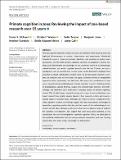Files in this item
Primate cognition in zoos : reviewing the impact of zoo-based research over 15 years
Item metadata
| dc.contributor.author | McEwen, Emma S. | |
| dc.contributor.author | Warren, Elizabeth | |
| dc.contributor.author | Tenpas, Sadie | |
| dc.contributor.author | Jones, Benjamin | |
| dc.contributor.author | Durdevic, Kresimir | |
| dc.contributor.author | Rapport Munro, Emilie | |
| dc.contributor.author | Call, Josep | |
| dc.date.accessioned | 2022-03-15T09:30:03Z | |
| dc.date.available | 2022-03-15T09:30:03Z | |
| dc.date.issued | 2022-09-26 | |
| dc.identifier | 277891097 | |
| dc.identifier | 05157bb6-32b2-420a-abd1-b849abfa93e0 | |
| dc.identifier | 85126215635 | |
| dc.identifier | 000768426400001 | |
| dc.identifier.citation | McEwen , E S , Warren , E , Tenpas , S , Jones , B , Durdevic , K , Rapport Munro , E & Call , J 2022 , ' Primate cognition in zoos : reviewing the impact of zoo-based research over 15 years ' , American Journal of Primatology , vol. 84 , no. 10 , e23369 . https://doi.org/10.1002/ajp.23369 | en |
| dc.identifier.issn | 0275-2565 | |
| dc.identifier.uri | https://hdl.handle.net/10023/25047 | |
| dc.description | This work was supported by the European Research Council under the European Union’s Seventh Framework Program (FP7/2007-2013)/ERC grant agreement no. 609819, SOMICS (EM, EW, ST), UK Economic and Social Research Council studentship 2267016 and the St Leonard’s Research Scholarship from the University of St Andrews (KD). | en |
| dc.description.abstract | Primate cognition research is reliant on access to members of the study species and logistical infrastructures to conduct observations and experiments. Historically founded in research centers and private collections, and spreading to modern zoos, sanctuaries, and the field, primate cognition has been investigated in diverse settings, each with benefits and challenges. In our systematic review of 12 primatology, animal behavior, and animal cognition journals over the last 15 years, we turn a spotlight on zoos to quantify their current impact on the field and to highlight their potential as robust contributors to future work. To put zoo-based research in context, we compare zoos to three other site types: university-owned or independent research centers, sanctuaries, and field sites. We assess the contributions of zoos across several critical considerations in primate cognition research, including number of investigations, species diversity, sample size, research topic diversity, and methodology. We identified 1,119 publications reporting studies of primate cognition, almost 25% of which report research conducted in zoos. Across publications, zoo-based research has greater species diversity than research centers and covers a diverse range of research topics. Although our review is merely a snapshot of primate cognition research, our findings suggest that zoos may present advantages to researchers regarding species diversity, and lack some of the methodological constraints of field sites, allowing greater ease of access to a diverse range of subjects for cognition investigations. We suggest that zoos have great potential as key contributors for future investigations in primate cognition. Finally, we shed light on the symbiotic relationship that can emerge between researchers and zoos, forming partnerships that bring unique advantages to both parties. | |
| dc.format.extent | 2580036 | |
| dc.language.iso | eng | |
| dc.relation.ispartof | American Journal of Primatology | en |
| dc.subject | Zoo research | en |
| dc.subject | Methodology | en |
| dc.subject | Primate cognition | en |
| dc.subject | QL Zoology | en |
| dc.subject | DAS | en |
| dc.subject.lcc | QL | en |
| dc.title | Primate cognition in zoos : reviewing the impact of zoo-based research over 15 years | en |
| dc.type | Journal item | en |
| dc.contributor.sponsor | European Research Council | en |
| dc.contributor.institution | University of St Andrews. School of Psychology and Neuroscience | en |
| dc.contributor.institution | University of St Andrews. Centre for Social Learning & Cognitive Evolution | en |
| dc.identifier.doi | 10.1002/ajp.23369 | |
| dc.description.status | Peer reviewed | en |
| dc.identifier.grantnumber | 609819 | en |
This item appears in the following Collection(s)
Items in the St Andrews Research Repository are protected by copyright, with all rights reserved, unless otherwise indicated.

